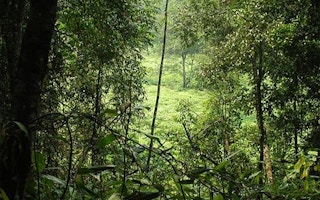Government and business leaders need to act quickly to stop forest loss and its negative impacts on both biodiversity and climate change, according to a new World Wide Fund for Nature (WWF) report.
The international NGO released the first chapter of its Living Forests Report today in Jakarta for the opening of the Business for the Environment Global Summit (B4E), which will be addressed by Indonesian president Susilo Bambang Yudhoyono.
The B4E Summit is held in partnership with WWF, international events organiser Global Initiatives and the government of Indonesia to jointly address urgent environmental issues.
The summit focuses on deforestation and how new models of sustainable forest management can benefit government, business and communities. This is also the topic of the Living Forests Report’s first chapter.
Based on a new global analysis showing that more than 230 million hectares of forest will disappear by 2050 if no action is taken, the report proposes that government and business unite around a goal of zero net deforestation and forest degradation (ZNDD) by 2020.
“We are squandering forests now by failing to sort out vital policy issues such as governance and economic incentives to keep forests standing,” said WWF International Forests director Rod Taylor.
WWF maintains that businesses using forest products have a competitive advantage if they source from well-managed forests and plantations. The report states: “Forest products are renewable and, when sourced from well-managed natural forests and plantations, tend to have a lower footprint than alternatives like steel, concrete and plastic based on fossil sources.”
The zero net deforestation and forest degradation model proposed in the Living Forests Report means the current deforestation rate of 13 million hectares per year would drop to zero.
But it allows room for sustainable forest-based businesses such as those relying on monoculture plantations and those improving degraded land, and stresses the importance of meeting the inevitable increased demands on forest resources.
“Better governance and economic incentives will enable sound stewardship of forests and more productive use of already- degraded land,” Mr Taylor said. “This would ensure enough farming land, timber plantations and well-managed forests to meet current global demand for wood and food without further forest loss.”
The report concludes that maintaining near zero forest loss in the longer term will require responses to rising pressures on forests due to demand for food, materials and fuel for a growing population, expected to hit 9 billion people by 2050.
“The Living Forests Model shows that conserving our forests is possible – and urgent. But it won’t be easy,” added Mr Taylor.
To discuss the challenges and opportunities relating to sustainable forest products, WWF will hold dialogues today with industry leaders from the forestry, mining and palm oil sectors of Borneo as part of a WWF initiative called the Heart of Borneo Green Business Network.
More than 40 per cent of Borneo’s forests are under concession to the private sector, with around 23 per cent (6 million hectares) under management by the forestry industry.
The Heart of Borneo initiative comprises a series of pilot projects in new forestry management models, and is the inspiration for WWF’s new international initiative – the Global Forest and Trade Network (GFTN).
“In the Heart of Borneo, tangible examples of how these systems work are emerging. WWF-Indonesia acknowledges that sustainability does not occur overnight. We call on the business sector to join with us as we take the first steps on the road to a green economy and low carbon future, not just in Borneo, but in Sumatra and Papua as well – step by step,” said WWF-Indonesia chief executive officer Pak Efran.
This week, WWF is calling on forestry companies and other sectors to join GFTN. The initiative’s target is to achieve certification of 75 per cent of key global commodities in the region by 2020.
Multinational retailer Carrefour has responded by endorsing the programme. The group’s two biggest suppliers for tissue paper in Indonesia, PT Graha Kerindo Utama and PT Graha Cemerlang Paper Utama are pledging to adhere to the sustainable forest management guidelines of international certifier the Forest Stewardship Council (FSC).
Adji Srihandoyo, Corporate Affair director for Carrefour in Indonesia, said, “Our ambition is both simple and strong: to become the preferred retailer. This can only be achieved by managing our retail business in a responsible and sustainable manner.”
Eco-Business.com’s coverage of the B4E Global Summit 2011 is brought to you by City Developments Ltd (CDL).















